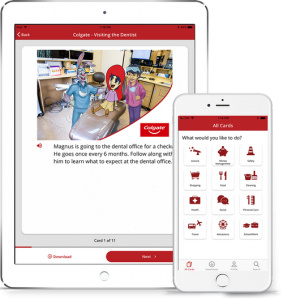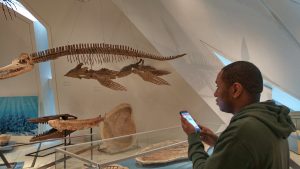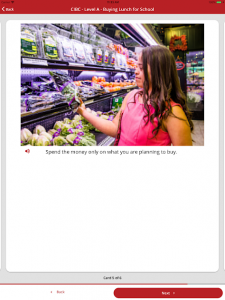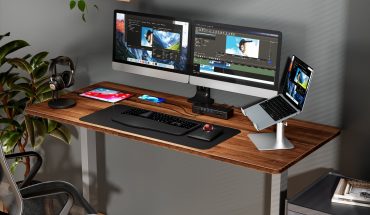Technology can be used to build a world of greater accessibility, inclusion, and independence for a lot of us, particularly if we are faced with special physical challenges or cognitive needs.
Special hardware and software tools – collectively called assistive or accessibility technology – are making a growing contribution.
By incorporating GPS, audio, video and other digital tools, smartphones can bring a kind of sight to visually-impaired and blind people.
And new AI-(artificial intelligence) powered mobile and desktop apps can provide support for the homeless and disenfranchised among us.
So it’s not surprising to find an early-stage tech company that’s developed an app to enable people with autism and special cognitive needs to live with greater independence.

Magnusmode founder Nadia Hamilton
What is a bit surprising and very inspiring is that the founder of the company never really set out to start a business – she set out to solve a problem.
Nadia Hamilton’s brother Troy is a young man with autism. She used to hand-draw pictures and notes for him to help him.
(While there is no standard “type” or “typical” person with autism, many individuals experience communication problems, difficulty with social interactions, and a tendency to repeat specific patterns of behaviour.)
Ms. Hamilton’s desire to help her brother and other people with special cognitive needs to participate more fully and to live with greater independence ultimately led to the founding of Magnusmode and the launch of an app that acts as a digital guide to daily living and common activities.
“I didn’t have a business background,” says company founder Nadia Hamilton, whose motivation was “one hundred per cent” her brother; wanting to help him and others like him. “I wasn’t expecting the experiences and learning I have been through.”

The Decks are hosted by Magnus, an animated interactive character who speaks with the user and provides guidance and reassurance when exploring or encountering new environments.
She’s learned a lot: her client/partner list now includes major companies and service providers such as Colgate-Palmolive, CIBC, New York City Subway, A&W, Toronto Pearson Airport, and many others.
Magnusmode’s digital guides, called Card Decks, use a combination of photos, media assets and text to provide step-by-step instructions for various social interactions, situations, behaviours, and activities.
There are some twelve categories covered at present, including shopping, travel, personal care, and banking. Card Decks can be published in English, French or Spanish, and they can be used offline without a Wi-Fi connection.
The Decks are hosted by Magnus, an animated interactive character who speaks with the user and provides guidance and reassurance while reinforcing the proper routines to follow when exploring or encountering new environments.
Each Deck can also be fully branded, reflecting the client company, its product or service, and its commitment to accessibility and inclusion.
The branding is a key component of the Magnusmode business model, as Hamilton described:
“Our business model is pretty unique: Magnusmode is an accessibility partner for corporations and we leverage the power of the corporate brand to connect, engage and enable those on the autism spectrum. These corporations have millions of buyers already; what is important for them is differentiation from other brands. We support their message and their brand promise in a direct and authentic way, and we help them understand how accessibility and the customer experience are connected, how one supports the other.”
Without real accessibility, she says, the customer experience is half-baked. Given that more than 750,000 Canadians are identified as having an intellectual or developmental disability, meeting their needs and enhancing their experiences must be considered as a crucial component of business success.
Take the case of Colgate, for example: an international consumer products company offering health, personal and dental care products, the brand promise is “Everyone deserves a future they can smile about.”
It is a logical extension of the brand to ensure “everyone” includes those with cognitive disabilities. The Magnusmode Card Deck is easily configured to support the brand, as well as the oral care outreach and education programs the company conducts in some schools.

Magnusmode Card Decks can help visitors to popular arts and culture institutions like the Royal Ontario Museum.
“Our business model allows us to maintain our focus on helping people,” Hamilton underscores. “We could have gone not-for-profit but, rather than constantly fundraising, we want to focus on creating innovative solutions that really involve our stakeholders. It’s tricky; we have to know their buying cycles and budgets, we need to be aware of the verticals in the marketplace, and we know they are also driven by accessibility rules and regulations (such as AODA and the Accessible Canada Act here; the Americans with Disabilities Act in the U.S.).”
Accessibility and inclusivity drive the product offerings and internal strategies at Magnusmode. When interviewed by WhatsYourTech, Hamilton was at the same time putting the almost-final touches on an updated company website and brand; even the animated Magnus character will get a bit of an overhaul.
Of course, the redesigned fits right in with Hamilton’s original goals for the company: “To help people with autism live their best lives. The updated branding, website, and app are all carefully designed to ensure that we live up to that goal every single day.”
She described the multi-step process of the redevelopment as including and incorporating meaningful feedback from stakeholders right across their diverse community of users, caregivers, teachers, and corporate partners.

There are some twelve categories covered in the Magnusmode Card Decks, including shopping, travel, personal care, and banking.
“We’re always listening and responding to the needs of our community. This evolution is fueled by their direct input. It’s an exciting period of growth and transformation, as Magnus evolves to better engage and support inclusive living.”
The new site will serve as a centralized resource for corporate partners and a caregiver community that needs guidance and empowerment to most effectively leverage Magnusmode resources for the people they support.
Reached during the current COVID-19 crisis, Hamilton was understandably cautious about future timelines but her enthusiasm for new company developments was clear.
“We’re really excited about the new website, and how the Magnus character is going to evolve. We have more ideas about how to engage and support people on the spectrum, the entire cognitive disability spectrum, in ways that are truly unique.”
-30-



